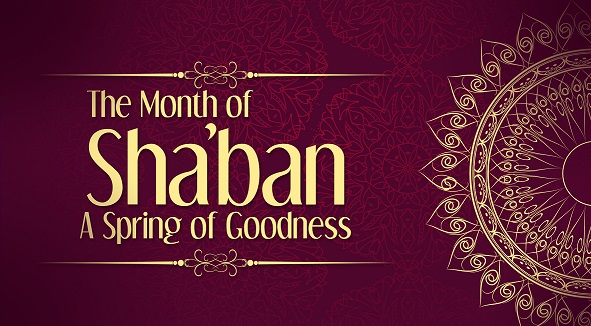

Shaban month
Shaban is the eighth month on the Hijri calendar. The three months of Rajab, Sha’ban, and Ramadan are considered among the most important months in the Islamic view. The month of Sha’ban is considered to be the month of the Prophet (PBUH & HP).
In this regard, Imam Ali (AS) says,
Ramadan is the month of Allah and Sha’ban is the month of the Prophet (PBUH & HP) and Rajab is my month (1)
Various important religious events take place in Sha’ban, including,
- The Birth of Imam Hussain (AS) (Sha'ban 3, 4 AH)
- The Birth of Abbas ibn Ali, the brother of Imam Hussain (AS) (Sha'ban 4, 26 AH)
- The Birth of Imam Sajjad (AS) (Sha'ban 5, 38 AH)
- The Birth of Imam Mahdi (AS) (Sha'ban 15, 255 AH)
The most important event of this month is Imam Mahdi’s birthday. Shiite Muslims celebrate this day and congratulate each other. Some also stay up on the eve of Sha’ban 15th and pray for the arrival of Imam Mahdi (AS).
The recommended practices in Shaban
In every month of the year, various prayers and practices have been recommended by the Prophet (PBUH & HP) or the Shiite Imams (AS). Among all, these three months, Rajab, Sha’ban, and Ramadan, are full of prayers and practices that you can say or do and we mention some of them for Sha’ban month below.
Fasting
Fasting is one of the most important practices you can do in Sha’ban.
In this regard Imam Sadiq (AS) said,
When Sha’ban arrives, Imam Sajjad (AS) had gathered his followers and he told them: “My companions! Do you know which month is this? the Holy Prophet (PBUH & HP) said, ‘Sha’ban is my month so fast in it for my love so that you can get closer to Allah.’” (2)
Also, the Holy Prophet (PBUH & HP) said,
The heavens are decorated every Thursday in Sha’ban and the angels tell Allah, ‘O our God! Forgive the ones who fast during this month and answer their call. (3)
He also said,
Anyone who fasts on Mondays and Thursdays of Sha’ban Allah will satisfy twenty needs of them in this world and twenty needs of them in the hereafter. (4)
As you may know, fasting in Ramadan is obligatory, but in Sha’ban it’s not mandatory and yet so recommended. It has also been recommended to fast in the last days of Sha’ban so that the fasting of Sha’ban and Ramadan combine.
Imam Sajjad (AS) said,
The fasting of Sha’ban and Ramadan can meet and if you fast these two months in a row your sins will be forgiven. (5)
Also, Imam Sadiq (AS) said,
Anyone who fasts during the last three days of Sha’ban, Allah will reward them as if they fasted two months in a row (6)
Prayers
- Every day in Sha’ban has an exclusive prayer; we mention the most important ones here.
You can say 70 times every day,
اَسْتَغْفِرُاللهَ وَ اَسْئَلُهُ التَّوْبَةَ: I Ask Allah for forgiveness and want him to turn back to me
- In the last three days of Sha’ban, it is recommended to say,
اللهُمَّ إِنْ لَمْ تَكُنْ غَفَرْتَ لَنَا فِيمَا مَضَى مِنْ شَعْبَانَ فَاغْفِرْ لَنَا فِيمَا بَقِيَ مِنْهُ: O Allah! If you haven’t forgiven us in the past days of Sha’ban, then forgive us in the remaining days of it.
The al-Sha’baniah prayer
The al-Sha’baniah prayer is one of the most popular Shiite prayers. This prayer includes various spiritual subjects and so many points about the attributes of Allah and His love. This prayer is narrated by Imam Ali (AS) and it is said that all the other Imams had always read this prayer during Sha’ban.
You can hear this prayer through this link
How should we pray?
There are some practices that are recommended to do before, during, and after our prayers, including;
Salwat
Salwat is a prayer that you say to remember Prophet Muhammad (PBUH & HP) and his progeny. This is Salawat:
اللهُمّ صَلِّ عَلی مُحَمَّد وَ آلِ مُحَمَّد و عَجِّل فَرَجَهُم
O, Allah! Bless Muhammad and the progeny of Muhammad and send their savor sooner
It is recommended to say this prayer before and after every other prayer you say. Imam Sadiq (AS) said,
Anyone who has a wish should start with Salwat, then ask Allah their wish, and after that say Salawat again because Allah is so great that he wouldn’t ignore a praying that is between two accepted prayers because Salawat is always answered by Allah and there is no obstacle for it. (7)
Raising hands
Imam Hussain (AS) said,
The Prophet (PBUH & HP) would always raise his hands for praying like a beggar who wants food. (8)
Praying in group
Imam Sadiq (AS) said,
When my father was sad, he would gather all the women and the children and pray and others would say ‘Amen.’ (9)
The Sha’ban month is a great opportunity for every servant of Allah to get closer to him by praying and doing the aforementioned practices. Actually, this month makes you ready for Ramadan because you can ask Allah for forgiveness in this month and if it is accepted, which is so likely, you will enter the Ramadan month while you are pure of any sin. So, do not lose this chance.
Resources
- Vasa’il ash-Shia, Sheikh Hurr al-Ameli, vol.10, pg.493
- Bihar al-Anvar, Allamah al-Majlesi, vol.94, pg.82
- Vasa’il ash-Shia, Sheikh Hurr al-Ameli, vol.10, pg.493
- Vasa’il ash-Shia, Sheikh Hurr al-Ameli, vol.10, pg.493
- Vasa’il ash-Shia, Sheikh Hurr al-Ameli, vol.10, pg.496
- Vasa’il ash-Shia, Sheikh Hurr al-Ameli, vol.10, pg.498
- Al-Kafi, Sheikh Koleini, vol.2, pg.494
- Bihar al-Anvar, Allamah al-Majlesi, vol.90, pg.294
- Al-Kafi, Sheikh Koleini, vol.2, pg.487
Share This Article

Backbiting General introduction
Backbiting is highly forbidden in Islam and is considered as a major sin. By speaking behind the back of others, people might deliberately spoil the dignity of each other, and in Islam, nothing is far more valuable than the honour of a human being. It is narrated from Prophet Muhammad (PBUH & HP) that during the miraculous night journey (Mi’raj) [i] that he (PBUH & HP) had, he (PBUH & HP) passed a group of people in hell who were scratching their own faces with nail. He (PBUH & HP) asked who they were. It was said that, those were the ones who used to backbite and dishonour others [1]. This punishment, besides others, was due to the fact that backbiting destroys the face of others and misrepresents them, hence, the backbiters scratched their faces which caused them to look more monstrous and nasty. Let’s see what Islam’s definition of backbiting, its conditions, types, consequences, etc is.
Meaning of Backbiting in Islam
According to Prophet Muhammad (PBUH & HP), backbiting is to mention and scold someone behind his back which is unpleasant and unkind to him/her [2]. It can be about his/her physical appearance, body, origin, character, deeds, or possessions like clothes, home, children or spouse.
Notice that there is a delicate difference between backbiting and slander. According to Imam Sadiq (AS), backbiting is to reveal something about your Muslim brother which Allah Almighty has concealed. But, revealing which is apparent such as being irascible or hasty is not considered as backbiting. But, slander is to attribute something to someone which is basically wrong [3].
The conditions to consider an act or a saying as backbiting
Not every act or saying about another person is backbiting. Backbiting is:
• If someone talks about the apparent and obvious characteristics of another person, it won’t be backbiting anymore, unless he\she intends to mock and deride that person. Hence, revealing the hidden defects of someone else is considered as backbiting whatever the intention is, but, talking about the obvious defects is considered as backbiting if one aims to reproach;
• When someone reveals the “defects” of someone else, but revealing the “strong points” of another person won’t be backbiting anymore;
• If the deficiency attributed to another person is unpleasant and blamed by everyone else;
• If one aims to dishonour another person by revealing his\her defects;
• And, if there is someone else who listens to or hears what is said about another person. It means that if one reviews someone’s defects by him\herself alone, it is not backbiting.

Backbiting is disapproved in Islam
Backbiting is so denounced in Islam that it is said: “Whoever dies while he had repented from backbiting, he\she will be the last who enters Heaven. And, whoever dies while have kept on backbiting, he\she will be the first who enters the Hell [4]!
In another narration, backbiting is compared to leprosy disease. It is said that backbiting ruins one’s faith much faster than leprosy disease ruins his\her body [5]. In surat Hujurat it is said: “O you who have faith! ... do not spy on or backbite one another. Will any of you love to eat the flesh of his dead brother? You would hate it. And be wary of Allah ...” (49:12).
Types of Backbiting
Backbiting is “mentioning” someone’s deficiency behind his\her back. Accordingly, the types of backbiting are:
• By words: it is the most common type of backbiting. It means one “speaks” about another person’s defect;
• By writing: if someone writes down the imperfection of someone else such that others can read it, too, the cartoons drawn to mock a personality or using someone’ pet phrase in order to make fun of him\her ;
• By act: if one reveals other person’s defect to someone else by showing or imitating it;
• By indirect words: like saying that “how lucky we are that we don’t have such a stingy partner!”;
• By gesture: like revealing one’s defect by a special movement of hand, head, eyes, etc.
Now that we found out how much backbiting is disapproved in Islam and what it is consists of, we need to find out its consequences, the way to prevent ourselves or others from backbiting, etc. Follow us on the second part of this topic to find the answers.
[i] The Mi’raj refers to the materialistic journey of the prophet Muhammad (PBUH & HP) from Mecca to Jerusalem, and from there, to the skies and back home again. That was during this journey that he (PBUH & HP) saw heaven and hell. For more details see: https://www.islamquest.net/en/archive/fa6152
References:
- Mirza Hussain Nouri, “Mustadrak al-Wasa’il”, vol. 9, p. 119.
- M. Naraqi, “Mi’raj al-Sa’sah”, p. 447.
- Shaykh al-Kolayni, “al-Kafi”, vol. 2, No. 7.
- Mulla M. Faydh Kashani, “Al-Mahajjat al-Baydha' ”, vol. 5, p.252.
- Shaykh al-Kolayni, “al-Kafi”, vol. 2, No. 1.
Read More
Lady Zainab and the Nurses' Day in the Islamic Calendar
Lady Zainab (SA) is an icon of purity, bravery, and steadfastness.Though she lived 14 centuries ago, her personality and teachings continue to guide men and women till now/to this day. She is the fruit of the tree of Prophethood nourished by Imamat. Lady Zainab (SA), the daughter of Imam Ali (As), has several attributes and titles associated with her, such as Al-Aqilah the noblewoman, Al-Aalimah or the knowledgeable woman and Aminatu-al-Allah, the faithful of Allah (SWT).
She belonged to a holy lineage; her mother was Lady Fatimah al-Zahra (SA), - the daughter of Prophet Muhammad (PBUH & HP) - and was actually a reflection of her father in the worship of Allah, piety, self-discipline, virtues, clemency, veneration, and the other features of perfection thus her father named her the chief of the women of the worlds and such a great mother nurtured Lady Zainab.
Lady Zainab’s life
Lady Zainab’s father, Imam Ali (AS) honoured as the representative, successor and heir to Prophet Muhammad (PBUH&HP) was given remarkable titles like ‘the chief of the prophets’ successors’, ‘leader of the pious ones’ and ‘the head of the worshippers’ by Prophet Muhammad (PBUH&HP) himself. With innumerable merits and unrivalled sacrifices for Islam he was recognised and reputed as the most knowledgeable, the most magnanimous, the most generous, the most abstinent, the most trustworthy, the best worshipper, the most faithful, and above all, the most pious and the bravest of all Muslims. In other words, he was the best Muslim after the Holy Prophet Muhammad. (PBUH&HP).

Lady Zainab (SA), hence, was born into the most pious family and raised under the care of the best human beings therefore she learnt many things that composed her perfect personality from the etiquettes of her parents and her brothers. Since early life, she was marvellous in her intellect and wisdom and had learnt the Holy Quran by heart as well as the Prophet’s sayings regarding Islamic laws, rules of education and principles of ethics.
Throughout her life she faced one tribulation after another, but emerged strong and victorious in all her trials. She then witnessed the martyrdom of her mother, father and brothers - Imam Hasan and Imam Hussain (AS) - and in Karbala where all male members of her family were brutally martyred including her own sons Awn and Muhammad, and all the women folk were taken into captivity. But despite all these vicissitudes she always remained a source of strength and a caretaker for the survivors of the tragedy of Karbala and the flagbearer of the message of this great event. She is the epitome of selflessness and perseverance, the embodiment of patience and courage in the face of oppressors and the personification of knowledge and purity. Despite all the hardships she endured in Karbala she decided to preserve and propagate the true message of Karbala While her bravery, eloquence, courage, asceticism, chastity and caring nature towards the survivors of the tragedy of Karbala has been and still is unparalleled in history.
The Holy Prophet Muhammad (PBUH&HP) says, “Whoever tries to fulfil the needs of a sick person, whether they fulfil it or not, they will be cleansed of their sins like the day they were born.”[1] In another tradition, he has said, “Whoever looks after the sick for an entire day, Allah (SWT) will raise them up with Prophet Abraham.”[2] If we would take only these two traditions into consideration, we can understand the greatness of Lady Zainab (SA) who cared for Imam Sajjad (AS) and all the children and women who had got sick or were injured after what happened in Karbala. Therefore, taking inspiration from her, the 5th of Jamadi-Al-Awwal which is her birthday is celebrated as the Nurses’ Day in the Islamic calendar.
References:
- Kitab Man La Yahzarul Faqih, V.4, Pg.16
- Sawab ul Aamal, Pg. 341
- https://www.al-islam.org/lady-zaynab-badr-shahin/life-lady-zaynab
- https://www.al-islam.org/victory-truth-life-zaynab-bint-ali-muna-haeri-bilgrami
Read More

